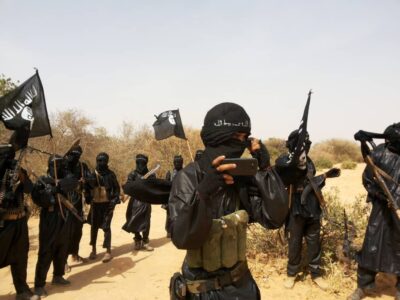
Islamic State terrorists killed hundreds in massacres across the Sahel
Islamic State’s claim of responsibility for the March 15 assault on Malian troops near Tessit, which left at least 33 soldiers dead.
Fighters from the Islamic State’s local wing, commonly referred to as the Islamic State in the Greater Sahara (ISGS), have reportedly perpetrated a series of recent massacres across the Sahel. Almost 300 people are believed to have been killed in these attacks.
Yesterday, militants purportedly belonging to ISGS attacked three separate villages in Niger’s Tahoua region. Estimates on the death toll have varied with the Nigerien government officially reporting at least 137 people were killed.
Local sources, however, have reported as many as 176 people were left dead by the militants. It is possible this number will continue to rise as local officials continue to search the area.
According to one local official, “armed men arrived on motorbikes and shot at everything [that] moved.”
Photos purportedly from the villages additionally show burned livestock and buildings, indicating total destruction of the villages.
While on March 15, suspected members of ISGS attacked a bus carrying civilians near the town of Banibangou in Niger’s Tillaberi region. The jihadists then raided a nearby village, killing more civilians and burning down granaries.
The Nigerien government initially reported that at least 58 people were killed in those attacks. This number, however, has since risen to at least 66 people.
That same day, ISGS launched a coordinated assault on a Malian military position near Tessit in the country’s northern Gao region.
In the Islamic State’s official claim for that operation, it stated its men killed 33 soldiers after it targeted a military convoy near Tessit. Mali has since confirmed the Islamic State’s number, adding that an additional 14 soldiers were also wounded.
Malian authorities further contradicted the Islamic State’s communique by instead reporting that it was an outpost in the locale that was indeed attacked by the jihadists. Al-Jazeera also reported that the jihadists targeted the base on technicals and motorbikes, a common tactic used by Sahelian jihadists.
Locals, however, reported at the time that Malian troops were ambushed as they travelled between Tessit and another nearby village.
ISGS has been particularly active in the Tessit area in recent weeks. That area also recently saw clashes between ISGS and al Qaeda’s local branch, the Group for Support of Islam and Muslims (JNIM), earlier this month.
These recent massacres follow similar attacks on two villages in Niger’s Tillaberi region in January that left at least 105 people dead. No group has claimed those assaults, but ISGS is widely suspected.
The Islamic State’s recent mass killings also come just a month after French President Emmanuel Macron stated that ISGS “has lost its grip and has suffered many losses” during his speech at the G5 Sahel summit in N’Djamena, Chad.
And just days before the massacres, the overall commander of France’s Operation Barkhane, Gen. Marc Conruyt, also touted that his men “continue to strike blows against ISGS.”
It is clear, however, that even though it has suffered tactical losses ISGS has shown the ability to withstand both a coordinated military offensive against it and efforts by JNIM to drive it out of various parts of the Sahel.
Source: Long War Journal





